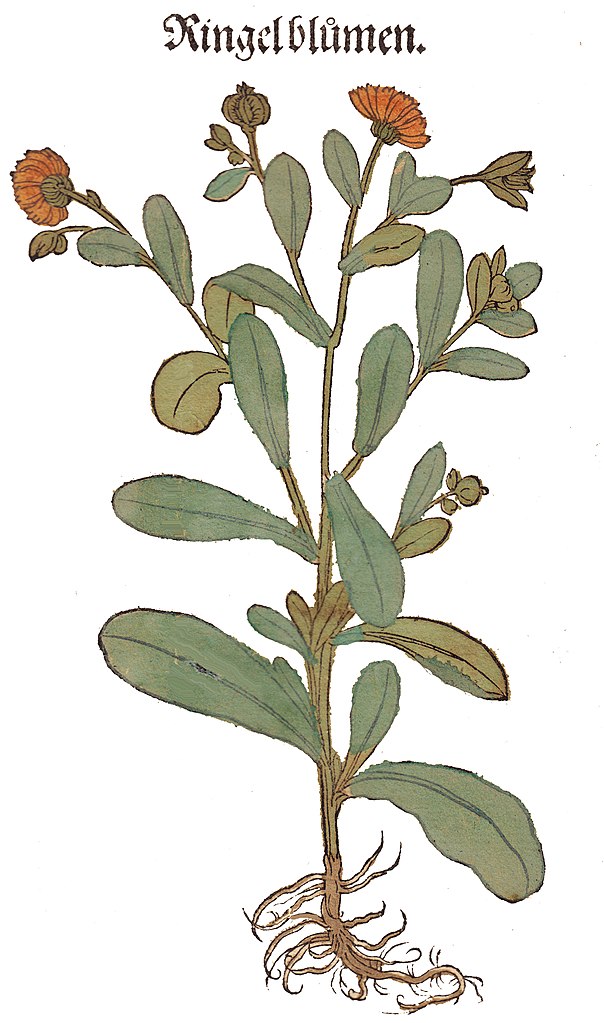The letter in flowers
(Poet's title: Der Blumenbrief)
Set by Schubert:
D 622
Schubert did not set the stanza in italics[August 1818]
Euch Blümlein will ich senden
Zur schönen Jungfrau dort,
Fleht sie, mein Leid zu enden
Mit einem guten Wort.
Du, Rose, kannst ihr sagen,
Wie ich in Lieb erglüh,
Wie ich um sie muss klagen
Und weinen spät und früh.
Du, Veilchen, sprich: sein Leiden
Wird jeden Morgen neu,
Von allem kann er scheiden,
Nur nicht von seiner Treu.
Du, Myrte, flüstre leise
Ihr meine Hoffnung zu,
Sag: auf des Lebens Reise
Glänzt ihm kein Stern als du.
Du, Ringelblume, deute
Ihr der Verzweiflung Schmerz,
Sag ihr: des Grabes Beute
Wird ohne dich sein Herz.
I shall send you, little flowers,
To that beautiful young woman over there,
Beg her to end my suffering
With a good word.
Rose, you can tell her
How much I am glowing with love,
How I have to lament because of her
And cry last thing at night and early in the morning.
Violet, say to her: “His suffering
Is renewed every morning,
He can leave everything behind,
But not his faithfulness.”
Myrtle, whisper gently
To her about my hope,
Say: “On life’s journey
The only star that shines on him is you.”
Marigold, explain
To her about the agony of despair,
Say to her: “Food for the grave
Is what will become of his heart without you.”
All translations into English that appear on this website, unless otherwise stated, are by Malcolm Wren. You are free to use them on condition that you acknowledge Malcolm Wren as the translator and schubertsong.uk as the source. Unless otherwise stated, the comments and essays that appear after the texts and translations are by Malcolm Wren and are © Copyright.
☙
Themes and images in this text:
Flowers Graves and burials Hearts Hope Journeys Laments, elegies and mourning Letters and correspondence Myrtle Pain Roses and pink Stars Tears and crying Whispering
In the early 19th century it was important not to commit too much to paper, and so correspondence had to be carefully constructed. Letters were often read aloud or seen by other members of the recipient’s family. In general, women were not allowed to write to unmarried men who were not blood relations, and they definitely were not allowed to write about any emotional attachments they were beginning to feel. If unmarried men wrote to unmarried women they had to be particularly careful with their language. Any expression of special affection could easily be read as an offer of marriage, yet in many countries men needed a certain income to enable them to make a proposal. This meant that ‘the language of flowers’ was frequently used as a way of expressing affection short of making a (contractually binding) declaration.
Schreiber’s bouquet (rose, violet, myrtle and marigold) is offered as a passionate, though whispered and coded, declaration of love and hope, presented to a woman whose lack of response is said to have plunged the poet into despair. His heart will soon be caught and eaten by the grave (‘des Grabes Beute’, lit. ‘the prey of the grave’, presents the grave as a sort of bird of prey or ravenous beast). This is a remarkably strong message for a little marigold to carry.

☙
Original Spelling Der Blumenbrief Euch Blümlein will ich senden Zur schönen Jungfrau dort, Fleht sie, mein Leid zu enden Mit einem guten Wort. Du, Rose, kannst ihr sagen, Wie ich in Lieb' erglüh', Wie ich um sie muß klagen Und weinen spät und früh. Du, Veilchen, sprich: sein Leiden Wird jeden Morgen neu, Von allem kann er scheiden, Nur nicht von seiner Treu'. Du, Myrte, flüstre leise Ihr meine Hoffnung zu, Sag': auf des Lebens Reise Glänzt ihm kein Stern als du. Du, Ringelblume, deute Ihr der Verzweiflung Schmerz, Sag' ihr: des Grabes Beute Wird ohne dich sein Herz.
Confirmed by Peter Rastl with Poetische Werke von Aloys Schreiber. Erster Band. Tübingen, bei Heinrich Laupp. 1817, page 90; with Aloys Schreiber’s Gedichte. Erster Theil. Neueste Auflage. Wien 1817. Bey B. Ph. Bauer, pages 86-87; and with Solothurnisches Wochenblatt für 1815. Herausgegeben von Freunden der vaterländischen Geschichte. Solothurn bey Ludwig Vogelsang, obrigkeitlichem Buchdrucker, Nro. 43. Samstag, den 28 Oktober 1815, pages 575-576.
To see an early edition of the text, go to page 86 [94 von 272] here: http://digital.onb.ac.at/OnbViewer/viewer.faces?doc=ABO_%2BZ160628102


